The COVID-19 omicron variant has not yet reached Peoria, but local health experts are already urging Peorians to do their part to protect themselves and others.
Dr. Sharjeel Ahmad studies infectious diseases and teaches at the University of Illinois College of Medicine Peoria.
During a Tuesday news conference, Ahmad urged those who are not yet vaccinated against COVID-19 to consider getting immunized. He also urged fully vaccinated residents to receive their booster shots once eligible.
He said having the booster does not guarantee someone immunity from COVID-19 or its variant strains – however, the vaccine and its booster doses will decrease relative severity of one’s infection.
“People can boost their protection against any variant by having the three doses of vaccination,” he said. “[Omicron] is a variant of concern, but it doesn’t mean this is a variant to be panicked about, at this point.”
Currently, Ahmad said there is no information to suggest symptoms with Omicron are different than those of other variants. The first case was detected in South Africa on November 24 and data is still limited.
While little is known about the new variant, Ahmad said scientists do know the Omicron has 50 mutations across its genome – 32 of which affect the spike protein, which is the target of the antibodies generated by COVID-19 infection and vaccination.
By contrast, the Delta variant had fewer than 30 mutations.
“But, it’s still not clear whether this causes more severe disease,” Ahmad said. “They are seeing increased rates of hospitalization in South Africa, but this may be due to increasing overall numbers of people getting infected, rather than, specifically, because of the Omicron.”
Peoria County is currently seeing the highest surge in active COVID-19 cases since April 30. As of Tuesday, 593 patients with COVID-19 were isolating at home, while 16 were being treated in area hospitals.
Tri-County COVID-19 caseload climbs to a 7-month high
Peoria City/County Department of Health Administrator Monica Hendrickson attributed the recent rise in cases to cold weather.
“As we move inward, where, again, our adherence to some of that non-pharmaceutical interventions… masking, social distancing, we’re not as necessarily on top of, has created that perfect storm where we’re seeing cases erupt,” she said.
About a third of cases are in the 5 to 11 age group, Hendrickson added.
“The things we do outside in our communities affect our schools,” she said. “We all need to step up to help our schools out.”

While it’s too early to determine the impact the Omicron variant will have on Peoria, Hendrickson encouraged Peorians who are not yet vaccinated to do so.
Any Peoria resident over the age of 5 can receive a coronavirus vaccination through the health department.
As of Monday, Illinois Department of Public Health (IDPH) figures showed 52.9% of Tri-County residents being fully vaccinated, with all three counties now above 50% (Peoria County 53.6%; Tazewell County 52.85%; Woodford County 50.1%)
Additionally, anyone over the age of 18 who is at least six months post-full vaccination is now eligible to receive a booster shot.
Hendrickson said boosters are critical because immunity from initial vaccination can eventually wane.
If people do not get their booster shots, they not only risk future infection, Hendrickson said; they themselves can be host to mutations of a new COVID-19 variants.
“This is a very precarious time we have right now,” she said. “There’s many of us – in fact close to 54% of our population – that have gotten their first round of vaccine. We need them to do, what they did the first time around, and step up, and get their booster.”
Ahmad says he hears from patients who got the vaccine, but are now hesitant to get the booster for whatever reason.
Getting a booster shot can also help those who have developed “breakthrough infections” – COVID-19 infection after full vaccination – from developing “long COVID” symptoms, Ahmad said.
He likened getting a COVID-19 infection with getting into a car accident. Getting the vaccine and its booster is like wearing a seat belt and installing air bags.
While these measures do not prevent one from getting into a car accident, they significantly decrease the likelihood of death and long-term consequences.
“Some unfortunate individuals are going to have … long-term consequences, even if you have a mild infection after vaccination,” he said. “The thing you have to remember is we know vaccinations are actually one of the most important and effective public health tools for preventing all kinds of infections. But nothing in life is 100%.”

Illinois residents can receive free COVID-19 testing at the Peoria Civic Center parking lot from 8 a.m.-4 p.m. Mondays, Wednesdays, Fridays and Saturdays.
These are PCR tests, which mean they have the ability to detect the genome sequencing of variants.
For more information on testing and vaccinations, visit the Peoria City-County Health Department's website.
Learn more: free COVID-19 testing at Peoria Civic Center


